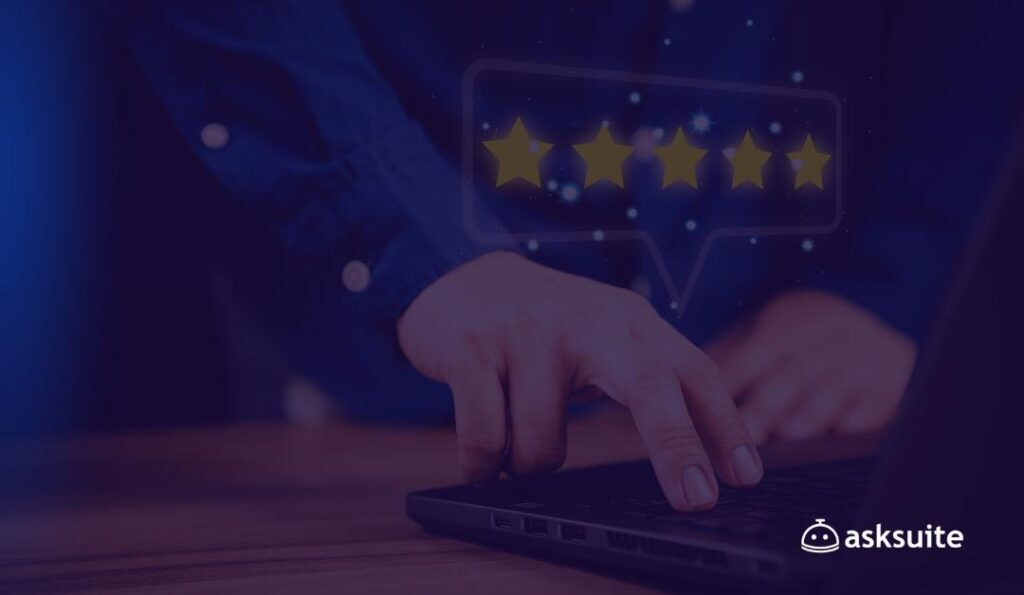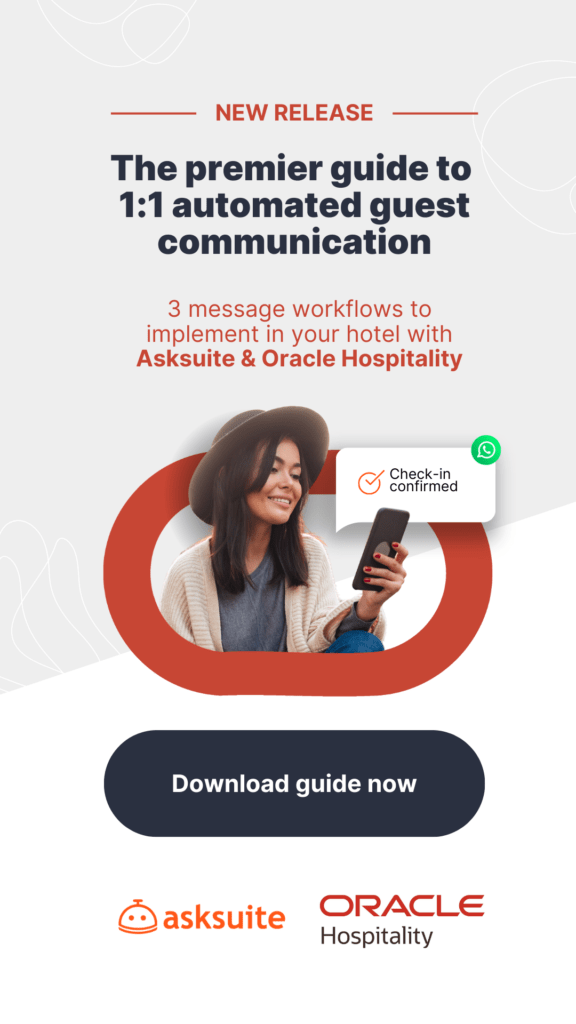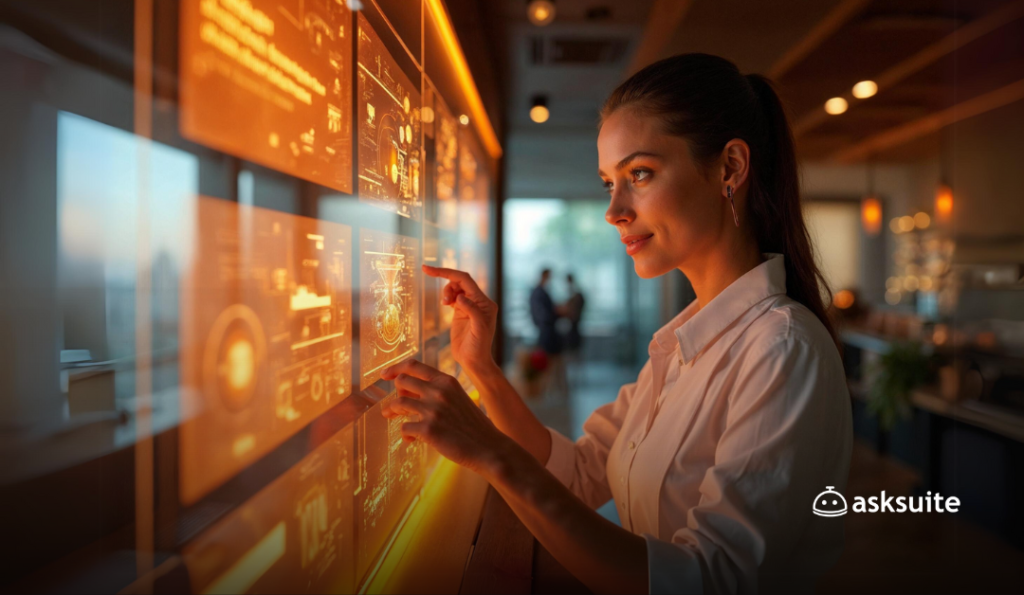Virtually every sector of the industry today is influenced by new trends. Whether it’s the latest technologies, Artificial Intelligence (AI), or new behavior models, it is undeniable that new ideas bring with them the need to implement changes in our businesses.
That’s why at the opening of the first day of Asksuite Insights – The Reservation Experts Summit in October 2021, Rodrigo Teixeira, CEO at Asksuite, spoke about the five trends in direct booking experience that are changing the hospitality industry.
This article is a transcription of Rodrigo’s lecture.
#1. From Mobile-First to AI-First
The first trend changing the direct booking and service experience involves the AI presence in our lives.
According to Google’s CEO, we are moving from smartphone and mobile-first interactions to the emergence of Artificial Intelligence, powered by Machine Learning assistants, complementing the human team.
Let’s imagine that you arrived at Heathrow Airport in London and outside there are two options that can take you to your hotel:
- An experienced taxi driver with more than 40 years of driving in London, but today he forgot his cellphone at home
- A young Uber driver who has the app to assist him/her
The question is, who would you choose?
Regardless of your choice, there is an excellent chance that the young driver will cross the city faster because he has a smart AI within the app to report instant traffic conditions.
This shows that even a beginner professional can use an AI superpower and easily outperform an experienced professional.
That’s why Brad Smith, the current Microsoft president, said that AI would be as transformative to society as the combustion engine over the next three decades.
This is a massive opportunity for the accommodation industry, as a recent study from Accenture reported that the accommodation industry has the second-highest profit potential by applying AI.
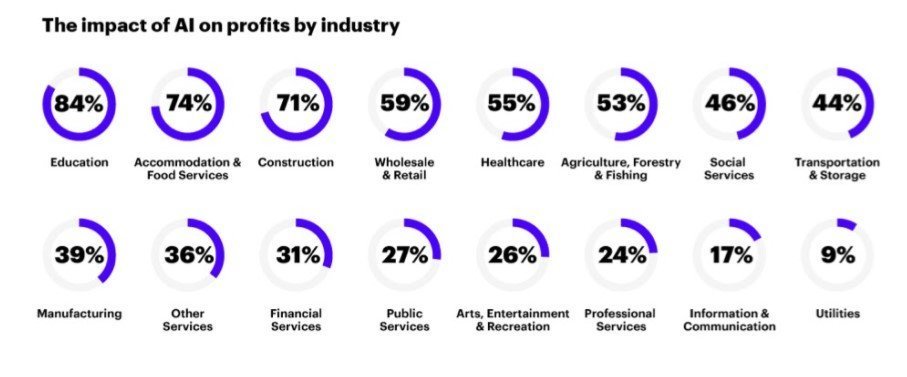

Rodrigo gave an example of how the AI can be helpful when it comes to customers: the last time he took a flight, he called the airline two days before to confirm the flight, and their AI agent assisted him.
The bot asked him to type his ID, and he got his response in less than 20 seconds. That was fast and efficient. The main point is: their sales team didn’t spend any time on an operational request that was not sales-related.
Also, it shows that we expect this quick experience not only in-person but also online.
#2. From Search to Ask
The second big trend that we are seeing is the shift from Search to Ask in customer behavior. Because, in general, consumers are impatient. We want the fastest route possible to get the information or the product we want, online or in-person.
For instance, we’ve seen Amazon invest a lot of money into Alexa. When big companies invest in something, it should grab our attention.
Another example — probably the best one — of a company that discovered the power of asking instead of searching is Google.
We simply love the Google experience because we don’t need to browse different pages on the website to find the information. We just ask Google and get an instant response.
This asking experience is the most effective way to personalize digital commerce and customer service.
With that in mind, why is your website so static for every traveler? Does that make sense? Have you ever thought about how many different needs each potential guest has?
Rodrigo stated that, at Asksuite, we had analyzed more than 350,000,000 messages on our website chat, and we have recorded more than one thousand different types of questions. It’s impossible to provide all this information on your website.
Websites usually don’t put what the company (or hotel) doesn’t have for obvious reasons. But that might cause hesitation in your potential clients, leading them to ask you a question to double-check.
Rodrigo explained with an example. He asked through the chatbot if a hotel accepted pets, and they didn’t. Probably they don’t have this information on their website.
Even if they have, we don’t want to spend our time browsing many different pages to find the information. So, if we don’t receive the information quickly, we will probably leave the website and try to locate it in an OTA, TripAdvisor, or a third party.
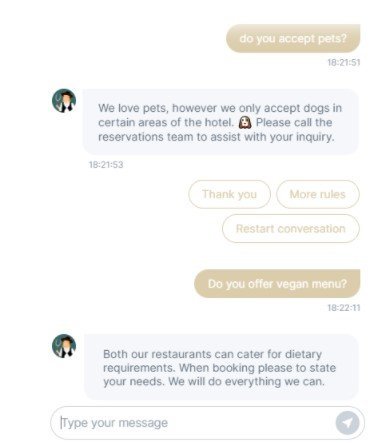
Another exciting chatbot feature is the ability to offer an option to travelers if the hotel can’t provide what they are requesting. For instance, a hotel may not offer a vegan menu but can recommend a restaurant specializing in this kind of food near the hotel.
That’s why we are seeing the use of virtual agents not only in hospitality but in many growing companies, providing instant information without the extra effort of searching. Uber, Sephora, eBay: all of them are using virtual agents.
You have probably experienced good and bad service experiences through AI, haven’t you? You must keep in mind that when the technology provider is focused on only one sector, the AI learning curve is becoming impressively good, improving the user experience.
On the other hand, generalist providers may face problems with user experience. Be careful with the experience you are offering.
According to Rodrigo, one of his favorite personalizations by Asksuite is that AI allows hoteliers to offer assistance in multiple languages. For example, suppose you are French, and you access a UK hotel website.
In that case, the AI agent will automatically recognize your language and offer French assistance from the beginning. Your hotel can choose to activate more than 30 languages.
#3 Shifting from Depending on Others to Self-Service
The third trend has grown a lot during the pandemic. People now are expecting innovative self-service options.
Nowadays, at every Mcdonald’s restaurant, you can find human service combined with self-service touch-screen technology. The main reason behind it is because the younger generations like to do everything themselves, quickly and interactively.
This concept also applies to digital experiences. Let’s say you are based in the US and would like to book a hotel in London, and you need to ask the hotel if an 8-year-old child can stay in the hotel for free. You don’t want to make an international call to find out.
A digital self-service option to answer your question as soon as possible would be ideal. According to SalesForce, 65% of customers prefer self-service for simple matters. And you probably do, too.
One of the key reasons is because we want to ask and get a reply when and where we need it.
Analyzing more than 23,000,000 travelers interacting with our Asksuite Chatbot, we have realized that 56% of travelers request service outside business hours, 40% from 6 pm to midnight.
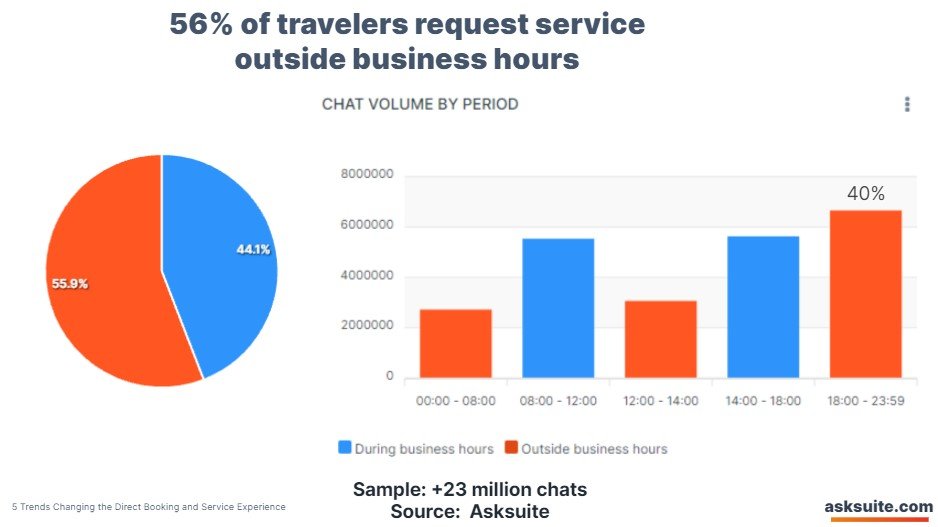
During the weekend, when hotels usually face the challenge of replying to customers, the number of service requests is almost the same as any other day of the week. As you can see in the graphic below, Sundays have more pre-stay service requests than Fridays in hospitality.
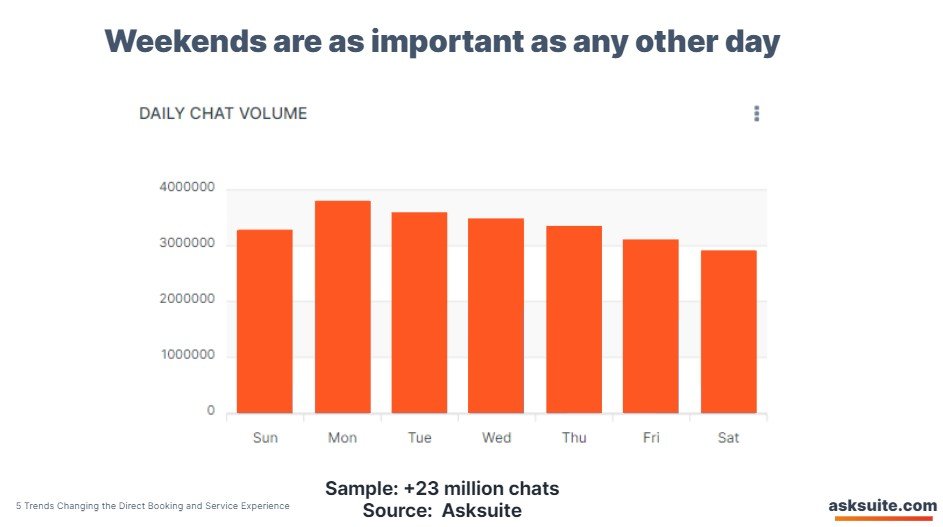
The same study by SalesForce mentioned before reported that for more than 78% of service professionals, customers have increased their use of self-service options during the pandemic. They also agree that it reduces request volume.
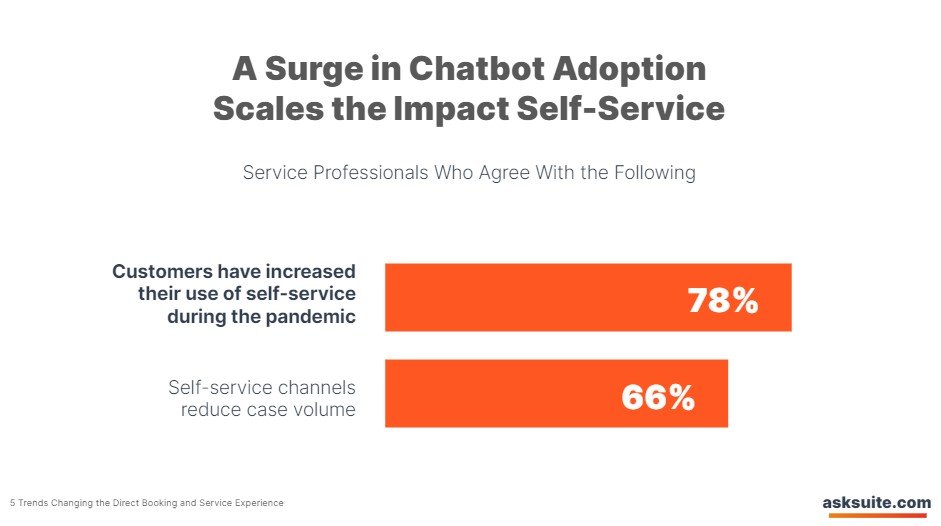
_________________________________________________________________________
If you want to know more about Hotel Technology Trends, listen to episode #13 of Asksuite’s HotelCast with Brendon Granger, Director and Technology Specialist at Technology 4 Hotels!
_________________________________________________________________________
#4 From Phone and Email to Messaging
The fourth big trend in customer behavior is the shift from email and telephone to messaging. According to Gartner, 56% of Millennials prefer using messaging to contact companies today.
The same study by SalesForce mentioned earlier states that companies say phone calls have dropped by 2% and emails by 3%, as you can see in the first two columns below. On the other side of the graphic, online chats increased 35% and Messenger Apps by 29% from 2018 to 2020.
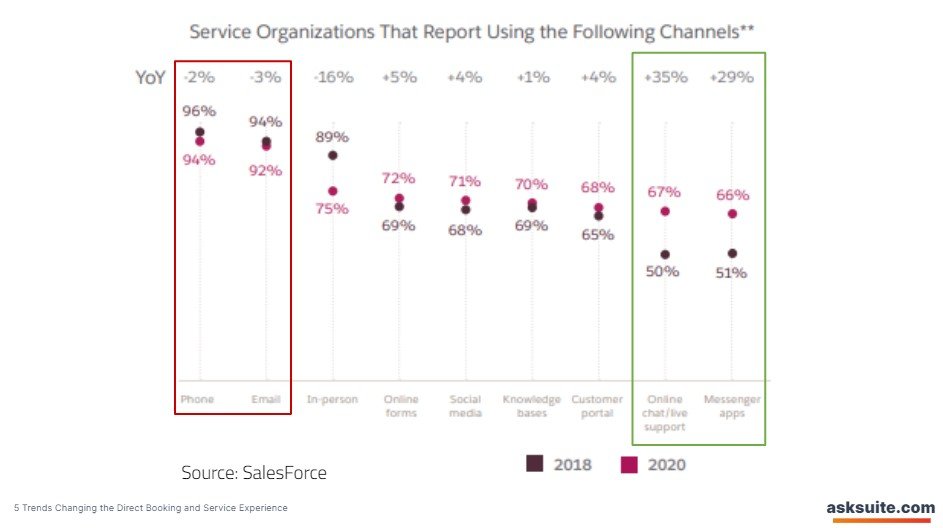
Through emails, customers have to wait hours or days to get a response. But, since the traveler decision-making process is quicker than ever, and no one will wait for you. That’s one of the reasons why messaging interactions with companies are increasing year after year.
Today, more than 71% of customers expect companies to communicate with them in real-time, and over 20 billion messages are exchanged with businesses on Messenger, an incredible 1000% increase from 2016.
In the 2000s, we saw the growth of websites; in the 2010s, we had the app revolution that today we use daily, such as banking, car rides, social media, etc. Now, the 2020s are marking the power of conversations.
If your hotel wants to increase international sales, you should know which messaging, and social media channels are essential for interactions with potential guests.
For instance, if you want to target Chinese travelers, you need to invest in WeChat as a channel; for Americans and Australians, Facebook Messenger. WhatsApp Business is also becoming a key channel for many regions, such as LATAM and the Middle East.
Many hotels worldwide are starting to implement the WhatsApp button on their website homepage as an alternative to the traditional ways of email or telephone.
The significant advantage for hoteliers is that they automatically capture leads when someone sends them a message on WhatsApp.
The user doesn’t need to fill out any forms, and by using a system to manage these interactions, the reservation team can follow up when they want.
Google is another big company investing in messaging. They launched Chat within Gmail, understanding that people want faster interactions, and Google My Business is becoming an essential contact channel for reservations day by day.
This new scenario creates a lot of challenges for hoteliers. Often, a traveler sends a message to a hotel, and the answer is that it can take up to 24h to have the question answered. This is not fast enough.
Or worse, they get an automatic answer informing them that they are only available from 9 am to 5 pm. If the customer is in another time zone, the challenge is even more significant!
Some hotels work with hotel marketing agencies. They are responsible for managing Social Media: Facebook and Instagram, for example. And many travelers click on your social page to learn more about the property, and they usually send inbox messages.
That means the agency, not you, will probably answer, and the reservation team won’t even have access to Direct Messaging to respond, leaving the customer with many unanswered questions regarding the hotel services.
Hotels must pay attention to these messaging channels because, based on our data, more than 50% of requests are price quotes, groups, packages, and offers.
It’s crucial to understand that social media and website chats are pre-stay interactions that can lead to sales. Therefore, your reservation team must be ready to assist them in their channel of choice.
#5 From Multichannel to Omnichannel
The fifth big trend is the shift from multichannel to omnichannel in customer service management. Let’s look at an example to understand:
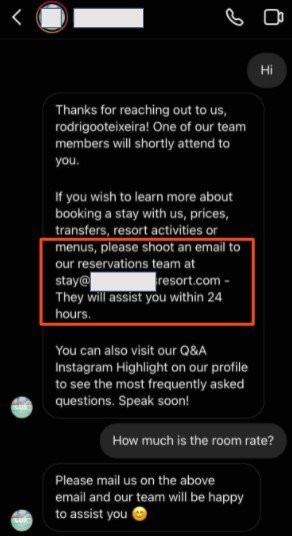
The image illustrates an Instagram DM to a hotel from a potential guest. The hotel replies with an automatic message, prompting the potential guests to email them if they would like information about reservations.
According to Rodrigo, this is the worst service experience possible: when clients contact a company via telephone, social media, messaging, and the company requests the client to reach them through another channel.
Of course, if the potential guests are asking on Instagram, they want a response on Instagram. Especially today, when many people simply hate using email on their cell phones.
So this is the number 1 rule for the customer service and reservation department:
The customer wants the answer on the same service channel where they made the first contact!
There are times when customers themselves ask to receive a response on another channel. They can send you a question on Messenger, for instance, and ask you to call them with a price quote for November 1st to 3rd.
One thing is for sure: they don’t want to repeat themselves every time they change the channel or speak to customer support. They expect that you know all the information from the previous request on the other channel.
That is why the hotel’s reservation team should always have access to the customer’s service history across all channels on one platform. That is what omnichannel service means.
If a potential guest sends you two messages on two different channels and you can’t connect these two requests, you are operating on a multichannel service platform, not an omnichannel platform.
Let’s see the picture below to understand this. On the left, there is the multichannel approach: you are available in multiple channels, but they are not connected.
On the right, we have the omnichannel structure, where you can see all interactions across multiple channels from the same customer in one place. That’s crucial to understand the complete potential guest journey.
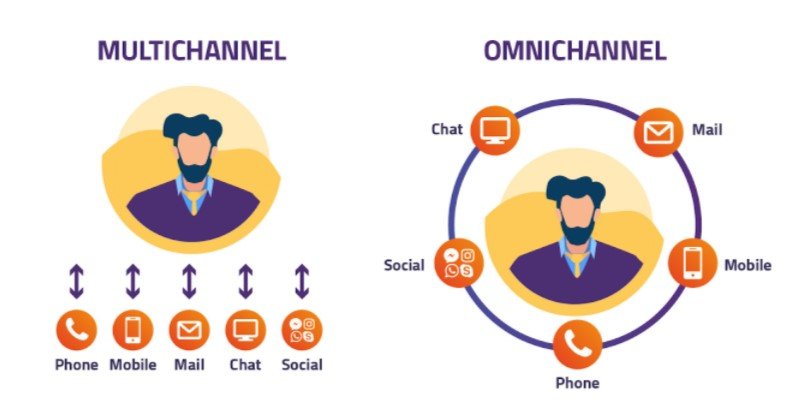
How do customers’ behavior impact reservations?
How do all these five trends impact the reservation channels in hospitality? The traditional direct reservation channels are telephone and email. If you offer a self-service experience, you have the website, a static FAQ page, and the booking engine.
With the changes we have seen in this article, the potential guests interact with your brand in many different messaging apps, social media platforms, and traditional channels.
Adapting your direct reservation strategy to this new world must be your priority. You should consider having AI combined with human agents available in every critical point of contact for your brand by offering the booking engine experience directly on each channel.
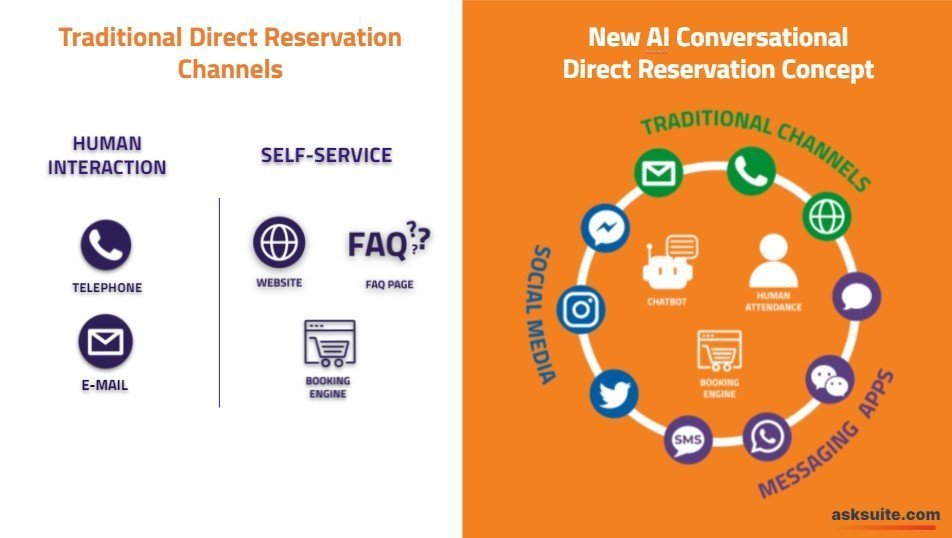
In this new reservation scenario, the AI reservation agent will be responsible for generating highly qualified revenue leads to your sales team 24/7: events, groups, spas, etc.
By adopting this strategy, you will stop losing revenue opportunities due to service unavailability or response time.
Due to the integration with your booking engine, AI can instantly quote on messaging channels. This will increase your self-service conversion rate via the website, social media, and booking engine.
At Asksuite, we have customers seeing a 26% conversion rate on their booking engine from leads generated by the chatbot.
The AI agent will provide instant responses to simple questions such as distance to the airport and check-in time. It will also reduce operational service requests for your reservation team by at least 50%.
And when you have the AI to complement your human reservation team, your staff members will see a lot of benefits:
- More time to focus on hot leads
- Increase service conversion rates
- Establish better targets for groups
- Add revenue possibilities to offer while assisting potential guests.
Another important thing: your Front Desk will direct their attention to stay requests and customer satisfaction.
Final Considerations
We saw here five significant trends impacting the hotel direct booking and service experience:
- From Search to Ask
- From Telephone and Email to Messaging
- From Depending on Others to Self-Service
- From Mobile to Artificial Intelligence
- From Multichannel to Omnichannel
Consumers’ behavior is changing fast, and hotels need to adapt even more quickly.
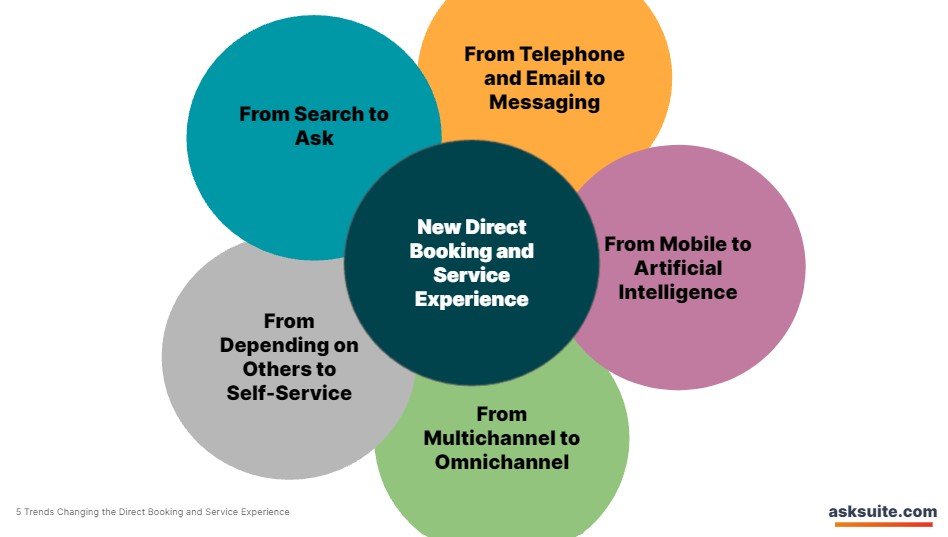
As a final message, Rodrigo brought a quote about sales and customer service from Nelson Boswell: “Here is a powerful yet simple rule: always give people more than they expect to get.”
That was Rodrigo’s talk at Asksuite Insights – The Reservation Experts Summit. We hope you enjoyed it and if you want to watch these lectures and other sessions, register here.
REGISTER NOW!